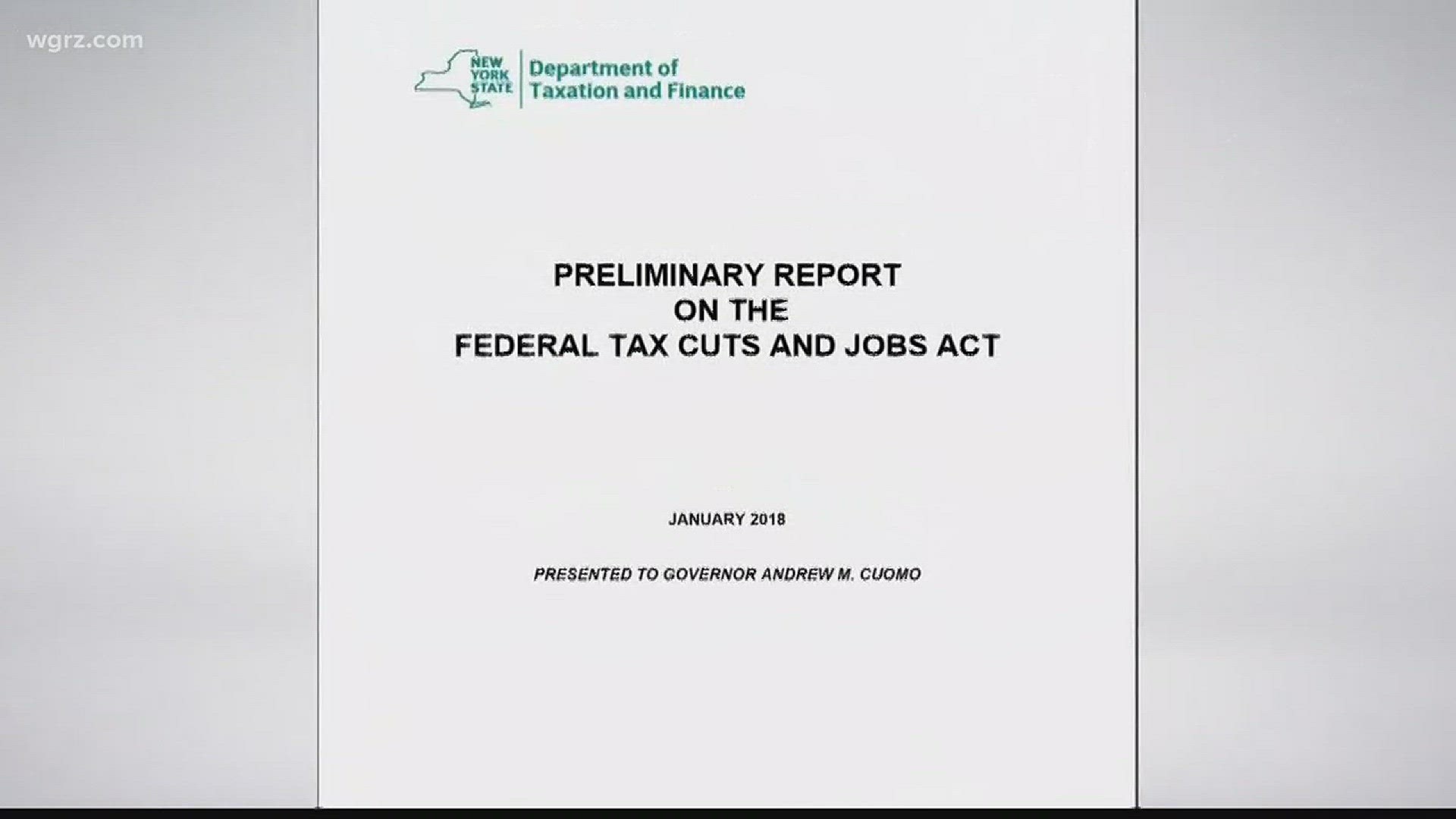BUFFALO, NY — After Gov. Andrew Cuomo made references to it during his budget presentation Tuesday, the NY State Tax Department of Taxation and Finance released a lengthy report Wednesday regarding ways the state may change its tax code, aimed at making an "end run", around new federal tax laws that eliminate the deduction for state and local income taxes.
Some leaders in high tax states like New York say the elimination of so-called SALT deductions, a staple on federal income tax returns for over a century, unfairly punishes residents of those high tax states.
Others, however, argue that such concerns would be eliminated if New York got its tax rates in line with most other states.
Payroll vs. Income Tax.
While the lengthy and detailed report addresses a host of implications from the new federal tax code, it mostly outlines scenarios being explored by the Cuomo administration to possibly eliminate the collection of income taxes from wage earners.
Instead, their employers would pay the state a payroll tax (which the report refers to as an employer
compensation expense tax) of an amount similar to what employers would have withheld from employees in income tax.
The idea here, according to the Governor, is that under the new federal tax laws the payroll tax would then be fully deductible for employers, holding them harmless in the end, while continuing to ensure the state’s treasury is funded in the absence of the income tax which would be eliminated.
A Complicated Plan.
However, what Cuomo referred to in his budget presentation as the New York State Taxpayer Protection Act might well be called the New York State Taxpayer Confusion Plan.
And perhaps with good reason. After all, it involves tax laws.
“It would restructure the New York tax code…so this gets a little complicated,” Cuomo conceded on Tuesday.
To that end, the report outlines several and - likely to most people- some very confusing scenarios on how that might work, each with its share of pitfalls.
The complications of such a plan would not only be numerous, but under some circumstances would apparently require certain employers to “volunteer” to be assessed a payroll tax.
For example, the report notes that New York State is constitutionally prohibited from levying a tax on the Federal Government.
So it could therefore not legally charge the federal government a payroll tax for the thousands of workers it employs in New York State.
As well, should the income tax for those workers be eliminated, they would enjoy a benefit other New Yorkers would not…and the state would lose $12 million annually, according to the report.
Another complicated scenario would involve local governments and the thousands of workers they employ, bound by civil service laws, and represented by unions.
A municipal government, which derives operational funds from the taxes it levies on residents, would have to raise its own taxes to cover the payroll taxes to the state. At the same time, because (unlike a private business) it does not pay taxes, the local government would be unable to write off the expense.
"Unless, and this is big unless…you got all the workers involved to voluntarily take a cut in their gross pay equal to what they were paying in income tax,” said E.J. McMahon of the Empire Center for Public Policy, a conservative based think tank. “I want to conger up what it would take to get more than 8 million government employees to take a gross pay cut under the assurance their take-home pay isn't changing,” McMahon said. “It gives you a headache just thinking about it.”
Indeed, the report acknowledges, “Without the means to adjust salaries downward, the ability of local governments to finance the additional costs associated with a payroll tax could be limited.”
There Would Still Be Income Tax.
Moreover, even if the state ditched income tax in favor of an employer payroll tax, there would still be a state income tax for income not derived from employment, such as dividends on stocks or interest from savings.
“So, you’d have to run two systems...which would be complicated," Cuomo said on Tuesday.
An Exercise in Futility?
McMahon also believes the whole thing to be unnecessary, noting that two-thirds of New Yorkers did not itemize on their tax returns, and therefore were not deducting state and local income taxes in the first place.
Further, according to the Empire Center, the majority of the state’s residents will actually see their tax burden lowered under the new federal tax plan, which doubles that standard deduction that most of the state’s residents were taking anyway.
“So we’re talking about going through all this rigmarole for a lot of people who are saving money anyway, so if they pull this off, it’s a waste of time and energy and a distraction. And the political capitol being expended on this should instead be devoted to fundamentally reducing the cost and the burden of government in New York state,” McMahon said.
Following the release of the report Cuomo, in a statement, thanked the Department of Taxation and Finance “for their hard work and diligence in developing this report. With this blueprint as a foundation, we will work with experts, the Legislature, employers, taxpayers, and other stakeholders to develop and implement changes to the tax code that protect all New Yorkers.”

